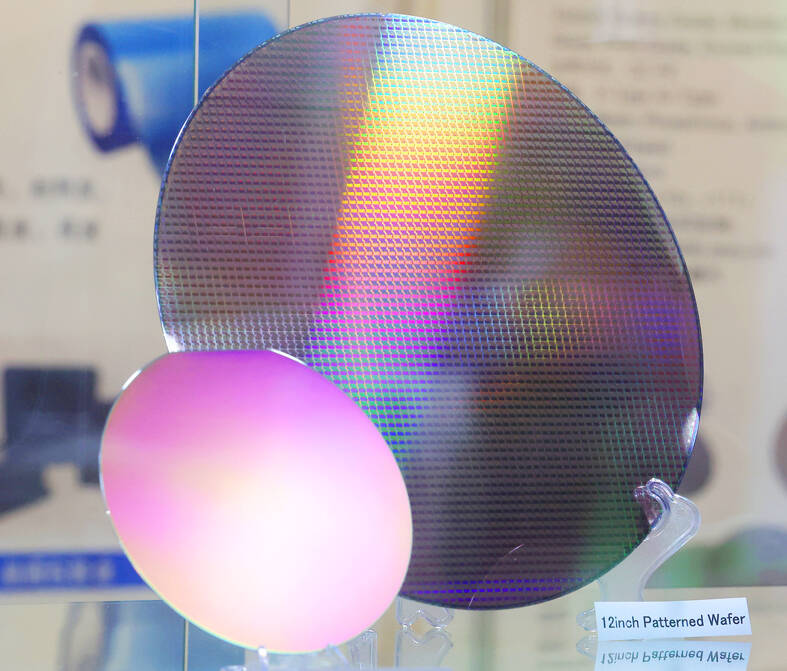A record number of exhibitors will this year attend Semicon Taiwan, an annual international trade fair in the semiconductor technology sector, when it opens on Wednesday next week in Taipei, organizer SEMI Taiwan said yesterday.
The annual event will feature more than 3,600 booths from over 1,100 exhibitors from home and abroad, the highest number since it was first held in 1996, according to SEMI Taiwan, an organization located in Hsinchu County that connects about 3,000 member companies and 1.5 million professionals worldwide to advance the technology and business of electronics design and manufacturing.
Ray Yang (楊瑞臨), an international strategy development consulting director at the government-sponsored Industrial Technology Research Institute (ITRI) and a committee member at SEMI Taiwan, said this year’s event has a theme of "Empowering AI Without Limits," and highlights the significance of silicon photonics and fan-out panel level packaging (FOPLP).

Photo: CNA
A forum focusing on silicon photonics will be held during the event, featuring experts from organizations and companies, including Taiwan Semiconductor Manufacturing Co (TSMC, 台積電), Inter-university Microelectronic Centre, and Marvell Technology Group Ltd, for discussions regarding the opportunities and challenges facing silicon photonics, Yang added.
Silicon photonics — known for its high bandwidth, low power consumption, long-distance transmission and cost-saving features — has become a hot topic in the semiconductor industry. It is estimated that the global silicon photonics market could reach US$7.86 billion by 2030.
In addition, a forum on FOPLP will also be held, with experts including those from Applied Materials Inc, Manz AG and Advanced Semiconductor Engineering Inc discussing and exploring related technological developments.
Driven by demand for 5G, artificial intelligence of things, automotive, high-performance computing and consumer products, FOPLP shows significant growth potential. According to research firm Yole Group, the market is expected to reach US$221 million by 2028, with a compound annual growth rate of 32.5 percent from last year to 2028.
Meanwhile, several TSMC senior managers, including executive vice president and co-chief operating officer YJ Mii (米玉傑), vice president of Pathfinding and Corporate Research Min Cao (曹敏), vice president of Advanced Packaging Technology and Service Jun He (何軍) and director of Advanced Packaging Business Development Jerry Tsou (鄒覺倫), will deliver speech at different forums during the event, Yang said.
He added that there will be 13 country sections at this year’s exhibition, with France, Malaysia and the Philippines new additions to the list.
Semicon Taiwan will take place from Wednesday to Friday at the Taipei Nangang Exhibition Center.

IN THE AIR: While most companies said they were committed to North American operations, some added that production and costs would depend on the outcome of a US trade probe Leading local contract electronics makers Wistron Corp (緯創), Quanta Computer Inc (廣達), Inventec Corp (英業達) and Compal Electronics Inc (仁寶) are to maintain their North American expansion plans, despite Washington’s 20 percent tariff on Taiwanese goods. Wistron said it has long maintained a presence in the US, while distributing production across Taiwan, North America, Southeast Asia and Europe. The company is in talks with customers to align capacity with their site preferences, a company official told the Taipei Times by telephone on Friday. The company is still in talks with clients over who would bear the tariff costs, with the outcome pending further

A proposed 100 percent tariff on chip imports announced by US President Donald Trump could shift more of Taiwan’s semiconductor production overseas, a Taiwan Institute of Economic Research (TIER) researcher said yesterday. Trump’s tariff policy will accelerate the global semiconductor industry’s pace to establish roots in the US, leading to higher supply chain costs and ultimately raising prices of consumer electronics and creating uncertainty for future market demand, Arisa Liu (劉佩真) at the institute’s Taiwan Industry Economics Database said in a telephone interview. Trump’s move signals his intention to "restore the glory of the US semiconductor industry," Liu noted, saying that

STILL UNCLEAR: Several aspects of the policy still need to be clarified, such as whether the exemptions would expand to related products, PwC Taiwan warned The TAIEX surged yesterday, led by gains in Taiwan Semiconductor Manufacturing Co (TSMC, 台積電), after US President Donald Trump announced a sweeping 100 percent tariff on imported semiconductors — while exempting companies operating or building plants in the US, which includes TSMC. The benchmark index jumped 556.41 points, or 2.37 percent, to close at 24,003.77, breaching the 24,000-point level and hitting its highest close this year, Taiwan Stock Exchange (TWSE) data showed. TSMC rose NT$55, or 4.89 percent, to close at a record NT$1,180, as the company is already investing heavily in a multibillion-dollar plant in Arizona that led investors to assume

AI: Softbank’s stake increases in Nvidia and TSMC reflect Masayoshi Son’s effort to gain a foothold in key nodes of the AI value chain, from chip design to data infrastructure Softbank Group Corp is building up stakes in Nvidia Corp and Taiwan Semiconductor Manufacturing Co (TSMC, 台積電), the latest reflection of founder Masayoshi Son’s focus on the tools and hardware underpinning artificial intelligence (AI). The Japanese technology investor raised its stake in Nvidia to about US$3 billion by the end of March, up from US$1 billion in the prior quarter, regulatory filings showed. It bought about US$330 million worth of TSMC shares and US$170 million in Oracle Corp, they showed. Softbank’s signature Vision Fund has also monetized almost US$2 billion of public and private assets in the first half of this year,